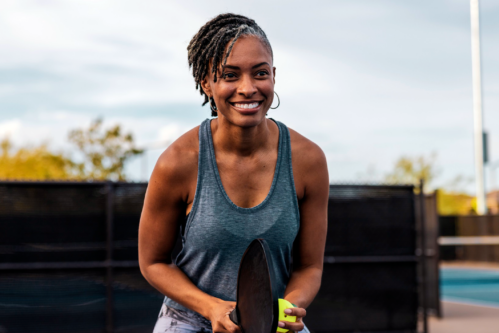by Jennifer Beck, MD
Sports Medicine Physician and Orthopedic Surgeon
for Adults and Children
While generally gentler on the body than many other sports, pickleball is not immune to injuries. Just like in other athletic activities, pickleball players can experience injuries due to various factors. Here, Dr. Jennifer Beck, a board-certified orthopedic surgeon and sports medicine specialist, outlines some common causes and types of injuries and guides when to seek medical assistance.
- Overuse: One of the primary reasons for injuries in pickleball and in many other sports is overuse. Repeated movements, such as swinging the paddle or running back and forth on the court, can lead to strains and overuse injuries in joints, muscles, and tendons.
- Poor Technique: Using incorrect form or technique when playing pickleball can increase the risk of injuries. For example, improper paddle grip or swinging mechanics can strain the wrist, shoulder, or elbow.
- Age and Fitness Level: Older adults often enjoy pickleball, and some may not be as physically conditioned as younger athletes. Age-related factors, including decreased flexibility and muscle strength, can make individuals more susceptible to injuries.
- Inadequate Warm-up and Stretching: Failing to warm up properly or not stretching before playing can lead to injuries. Adequate warm-up and stretching routines can prepare the muscles and joints for the game’s physical demands.
- Footwear: Wearing improper footwear with inadequate support can result in slips, falls, and ankle injuries on the pickleball court.
- Court Conditions: The condition of the pickleball court, including uneven surfaces or debris, can contribute to injuries if players trip or stumble.
- Competitive Play: Intense and competitive play can lead to riskier movements and higher chances of collisions between players, resulting in injuries.
- Fatigue: Playing for an extended period without proper breaks can lead to fatigue, which increases the risk of injuries due to decreased coordination and muscle control.
- Lack of Protective Gear: While pickleball is generally considered a low-impact sport, wearing protective gear such as wrist braces or knee pads can help prevent injuries, especially for players with pre-existing conditions or vulnerabilities.
Common pickleball injuries
- Ankle Sprains: Rolling or twisting the ankle is a common injury in any sport, including pickleball. This can happen while running or making sudden movements on the court.
- Knee Injuries: Overuse or sudden twisting movements can lead to knee injuries, such as ligament sprains or meniscus tears.
- Shoulder Injuries: Repetitive overhead motions, like serving or smashing, can cause shoulder injuries, including rotator cuff strains or tendinitis.
- Elbow Injuries: Tennis elbow, or lateral epicondylitis, can occur due to the repetitive motion of hitting the ball. It causes pain on the outside of the elbow.
- Wrist and Hand Injuries: Strains or sprains in the wrist or hand can happen from repetitive gripping of the pickleball paddle or from falls on an outstretched hand.
When to seek medical treatment
If you experience any of the following signs or symptoms, it’s advisable to see a doctor:
- Severe pain or swelling that does not improve with rest, ice, and elevation.
- Inability to move or bear weight on a joint.
- Visible deformity or severe instability in a joint.
- Persistent pain that lasts more than a few days.
- Numbness, tingling, or loss of sensation in any body part.
- Difficulty breathing or chest pain after a fall or collision.
- Head injury with symptoms like dizziness, confusion, loss of consciousness, or persistent headache.
It’s always better to err on the side of caution and consult a healthcare professional if you’re uncertain about the severity of an injury or if you have any concerns. They can provide an accurate diagnosis and recommend appropriate treatment or rehabilitation measures.
About Jennifer Beck, MD, FAAOS, SM-CAQ
Sports Medicine Physician and Orthopedic Surgeon
Adults and Children
Dr. Jennifer Beck is board-certified in orthopedic surgery and sports medicine for adults and children. Her specialty areas include:
-
- ACL Tears
- Patella Instability
- Knee Surgery
- Meniscus/Discoid Meniscus Arthroscopic Surgery
- Arthroscopic Surgery
- Fracture Management
- Sports Injuries
- Outpatient Surgical Procedures
Before opening her practice at Boulder Medical Center, Dr. Beck was associate director at The Luskin Center for Sports Medicine, Orthopaedic Institute for Children in Los Angeles, and Assistant Professor of Orthopedic Surgery at the David Geffen School of Medicine at UCLA.
Dr. Beck practices in Boulder and Louisville, Colorado.
Resources
- Call (303) 440-3036 for an appointment
- Get to know Dr. Jennifer Beck


